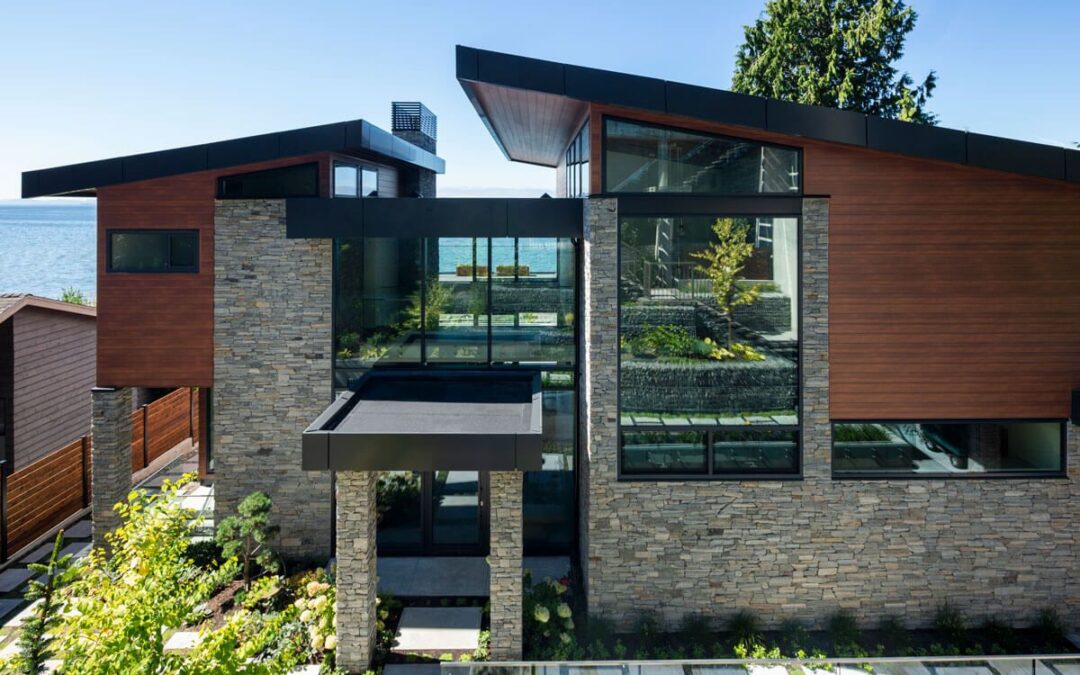Vancouver’s coastal, rainy, and mild climate is tough on building exteriors. With over 1,100 mm of rain per year (Vancouver averages around 169 rainy days annually), frequent overcast skies, and occasional temperature swings, a siding material that performs well here must resist moisture, allow drying, and stay dimensionally stable over time.
So, when selecting an exterior finish, you want something that can handle constant wetness, wind-driven rain, fungal growth, and little freeze-thaw stress. To help you make the decision, we have compared three common choices, fiber cement, metal cladding, and high-quality engineered wood, to show how each performs in Vancouver conditions.
Fiber Cement
Fiber cement siding is made from cement, sand, and cellulose fibres (reinforcement). It is engineered to mimic wood, stone panels, or shingle textures while being much more durable.
Performance in Vancouver climate
- Because it contains no organic wood core, it resists rot, warping, and insect damage even under constant moisture exposure.
- When properly installed with flashing and a rainscreen gap, it sheds water well and allows the wall behind to dry.
- It holds paint well and does not expand or contract drastically with humidity changes.
- Requires painting every decade or two, depending on exposure.
Drawbacks to watch
- Installation is labour intensive and requires precise sealing at joints, corners, and around penetrations.
- If moisture infiltrates behind siding (via poor flashing), damage can occur.
- The material is heavier and cost per square foot is higher than simpler alternatives.
Key takeaway:
Fiber cement offers one of the strongest balances of durability and low maintenance for Vancouver’s wet climate, provided it is installed with good flashing and moisture control.
Metal Cladding (Steel or Aluminum)
Metal siding—especially painted or coated steel or aluminum panels—is a modern choice that offers durability and minimal upkeep.
Performance in Vancouver climate
- Metal does not absorb water, so it will not rot or swell.
- Coatings and finishes can include corrosion resistance to withstand coastal moisture and salt air.
- Panels are rigid and perform well under wind load when anchored properly.
- There is little maintenance beyond cleaning and occasional repainting or recoating.
Drawbacks to watch
- Metal can dent or scratch, especially in hail or impact events.
- Thermal expansion and contraction are real: temperature swings cause the panels to shift, so installation must allow for movement.
- Sound and thermal bridging can be an issue if insulation or isolation is not included behind metal panels.
- Poor-quality coatings may fade or chalk over time under UV exposure.
Key takeaway:
Metal cladding provides a durable, low-maintenance shell for a home in Vancouver, but success depends on good thermal detailing, corrosion-resistant finishes, and backing insulation.
Engineered Wood (Composite Wood)
Engineered wood siding is made from wood fibres, resins, and protective coatings. It is designed to give the appearance of real wood with improved durability.
Performance in Vancouver climate
- With high-quality sealing and protective coatings, engineered wood resists moisture much better than raw wood.
- It is lighter and easier to cut and install compared to fiber cement.
- It tends to fare better dimensionally than natural wood when humidity fluctuates.
- When maintained (re-sealing, refinishing), it can look warm and natural.
Drawbacks to watch
- Edges, joints, and cut surfaces remain vulnerable to water intrusion; poor sealing can allow water damage.
- Coatings will degrade over time and must be maintained.
- Lifespan may be shorter than fiber cement or well-installed metal in harsh conditions.
- It can attract mold or staining if moisture is trapped.
Key takeaway:
Engineered wood is a compelling option when you want the aesthetic warmth of wood, but it only performs well in Vancouver when sealed meticulously and maintained regularly.
How to Choose for Your Project
When deciding among these finishes, consider your priorities and site exposure:
- For long-term durability with moderate maintenance: fiber cement is often the safest bet.
- For a sleek, modern aesthetic and minimal upkeep: metal siding is attractive, so long as detailing is done right.
- For a traditional or warm aesthetic with a compromise approach: engineered wood works if you’re willing to maintain it.
Also, no matter which material you pick, proper installation is critical. That means good flashing, rainscreen systems, moisture barriers, ventilation gaps, and insulation details. The best material will still fail if installed poorly.
At Best Builders, we tailor siding recommendations to your lot, exposure, and climatic factors unique to Vancouver. If you want help comparing finishes, laying out installation details, or estimating long-term maintenance for your project, we are happy to assist.
Best Builders has been renovating existing homes and building new ones for over 20 years. They are a multiple-award-winning builder that brings fine craftmanship to projects, turning dreams into reality. If you have any questions about this article or would like to talk to us about your home project, please call us at (604) 943-2378 or email us at info@bestbuilders.ca

